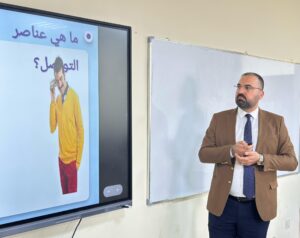Kirkuk Technical Medical Institute Organizes a Medical Symposium Titled “Pharmacy Ethics”
Under the patronage of Professor Dr. Alia Abbas Ali Al-Attar, President of the Northern Technical University, and under the direct supervision of Assistant Professor Dr. Lizan Madhat Muhammad, Dean of Kirkuk Technical Medical Institute, the Department of Pharmacy Technology at Kirkuk Technical Medical Institute, in cooperation with the Continuing Education Unit, organized a course titled “Pharmacy Ethics.”
The lecture was delivered by:
1. Asst. Ms. Umaima Abdul Karim Muhyiddin, Lecturer in the Department of Pharmacy Technology and Head of the Scientific Unit.
2. Abdullah Abdul Aziz Ahmed, Head of Pharmacists, Kirkuk Health Department, Women’s and Children’s Hospital.
Objectives of the Symposium:
1. Introduce students to the most prominent and important professional duties of the pharmacist assistant.
2. Identify social communication skills in the workplace.
3. Employ conscious and educated communication methods and highlight the use of leadership, management, and wise leadership in healthcare institutions.
Seminar Contents:
1. Healthcare ethics is a set of principles, values, and beliefs that inform healthcare decision-making. Considering and adhering to all ethical aspects when making any decision will provide us with sound, just, and equitable options for patients.
2. Course Aspects:
1. Definition of professional ethics.
2. Principles and elements of professional ethics.
3. Various social communication skills.
4. Recommendations
Adherence to the most important ethical codes of conduct and behaviors that healthcare practitioners should adhere to both during and outside of healthcare practice, whether related to themselves and their profession, or toward colleagues in the profession and their community. Professional ethics related to commercial, financial, and research matters in the healthcare field are fundamental principles for healthcare professionals. Monitoring the required ethics of healthcare practitioners toward patients, particularly in normal and abnormal circumstances, is essential, given that the patient is the primary and direct beneficiary of healthcare work. Healthcare practitioners should be aware of the direct positive or negative impact of adhering to these ethics or violating them.



